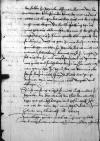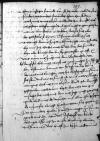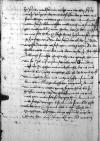Ewr[1] H(erlichkei)t ⌊⌋ neben unsers sundern, vertrautten freundes, hern ⌊Hanses von Werd(en)⌋, auch eines ⌊ersamen radts von Danczke⌋, / hab ich gestern ⌊⌋, / und hab nicht ungern gelesen meiner lanndsleut widerkern. / Das sie sich aber der geltsteur, / so die von ⌊Thorn⌋ und ⌊Elbing⌋ sich villeicht daraus zugeen, / besuren, / het wenig stille bey mir. / Ich halts noch da vor, das / das hundts beyn oder ⌊knoche⌋ dar ein sey gewerffen gewest / etc. Was ewrn auszueg mit dem geschickhten von ⌊Dangzke⌋ belanngt, / waiss ich noch nichts zu schreyben, / biss mein dienner von ⌊ko(niglicher) m(ajeste)t⌋ wider kome. / Der wirt mit bringen, / was die botschafft auf curie sol sein, / und wie es sunst ist umb alles. / Nichts wenigers hab ich ein ⌊ersam radt gen Danczk⌋ ⌊⌋ noch ewrm[2] beger, / das ichs vor gut an seche, das noch mit dem aus zoge nicht geeylleth werde, / und mich der ursachen auf Ewr H(erlichkei)t gezogen, die anzweifel / bericht hierinne von sich gegeben / etc. Des hanndels halben, so wir im wagen zu samen geredt, und den hern von ⌊bischoff von Kraka⌋ belanget, / losse ich in unser beredung berwen[3], / und so wir mit Gots hulf im korzen widerumb  AAWO, AB, D. 67, f. 297v zu samen werd(en) komen, muge wir weitter, / so sich was zu truge, / under uns entslissen. / Des guetten und freuntlichen willens gen mir thu ich mich mit allem fleiss bedannckhen. Will mich auch so widerumb hidden by binding⌈[b]b hidden by binding⌉ geen euch und die ewrn[4] halten, / das ir kein misfallen hidden by binding⌈[n]n hidden by binding⌉ an mir solt haben etc. Negst, do wir zusamen sein gewest, ist zwischen uns von der form(m) des eidts zu reden vergessen, / wolhe ich fast gern wolt sechen. / Bit der halben, welt mir die mit dem ersten zu schickhen. / ⌊Olbrecht Finckht⌋ ist hie bey mir gewest, / het mir von ⌊fer(stlicher) ir(laucht)t⌋ auf unsern schreiben von ⌊G written over B⌈BGG written over B⌉raudens⌋, negst vor in gethon, ⌊⌋ bracht, / des ich euch hiemit ein copey eingelegt. / Er bit rodt und hulf. Vermueget ir im mit meym hohem freundt, dem hern ⌊margenborgschen weywod(en)⌋, / den ich von meinem wegen gantz freuntlich bit zu grussen, was guets verhelffen, / will ich a written over e⌈eaa written over e⌉uch noch gern mein fleiss darpey thun, / do mit nit mi written over e⌈eii written over e⌉t solchen verjagen diss lanndt frembde geste uberkhuene etc. Hiemit lebe E(wer) H(erlichkei)t, Gothe dem almechtigen befelhen, lange gesundt.
AAWO, AB, D. 67, f. 297v zu samen werd(en) komen, muge wir weitter, / so sich was zu truge, / under uns entslissen. / Des guetten und freuntlichen willens gen mir thu ich mich mit allem fleiss bedannckhen. Will mich auch so widerumb hidden by binding⌈[b]b hidden by binding⌉ geen euch und die ewrn[4] halten, / das ir kein misfallen hidden by binding⌈[n]n hidden by binding⌉ an mir solt haben etc. Negst, do wir zusamen sein gewest, ist zwischen uns von der form(m) des eidts zu reden vergessen, / wolhe ich fast gern wolt sechen. / Bit der halben, welt mir die mit dem ersten zu schickhen. / ⌊Olbrecht Finckht⌋ ist hie bey mir gewest, / het mir von ⌊fer(stlicher) ir(laucht)t⌋ auf unsern schreiben von ⌊G written over B⌈BGG written over B⌉raudens⌋, negst vor in gethon, ⌊⌋ bracht, / des ich euch hiemit ein copey eingelegt. / Er bit rodt und hulf. Vermueget ir im mit meym hohem freundt, dem hern ⌊margenborgschen weywod(en)⌋, / den ich von meinem wegen gantz freuntlich bit zu grussen, was guets verhelffen, / will ich a written over e⌈eaa written over e⌉uch noch gern mein fleiss darpey thun, / do mit nit mi written over e⌈eii written over e⌉t solchen verjagen diss lanndt frembde geste uberkhuene etc. Hiemit lebe E(wer) H(erlichkei)t, Gothe dem almechtigen befelhen, lange gesundt.
 AAWO, AB, D. 67, f. 297r herr, gunstiger freundt.
AAWO, AB, D. 67, f. 297r herr, gunstiger freundt.
 AAWO, AB, D. 67, f. 297v zu samen werd(en) komen, muge wir weitter, / so sich was zu truge, / under uns entslissen. / Des guetten und freuntlichen willens gen mir thu ich mich mit allem fleiss bedannckhen. Will mich auch so widerumb hidden by binding⌈[b]b hidden by binding⌉ geen euch und die ewrn[4] halten, / das ir kein misfallen hidden by binding⌈[n]n hidden by binding⌉ an mir solt haben etc. Negst, do wir zusamen sein gewest, ist zwischen uns von der form(m) des eidts zu reden vergessen, / wolhe ich fast gern wolt sechen. / Bit der halben, welt mir die mit dem ersten zu schickhen. /
AAWO, AB, D. 67, f. 297v zu samen werd(en) komen, muge wir weitter, / so sich was zu truge, / under uns entslissen. / Des guetten und freuntlichen willens gen mir thu ich mich mit allem fleiss bedannckhen. Will mich auch so widerumb hidden by binding⌈[b]b hidden by binding⌉ geen euch und die ewrn[4] halten, / das ir kein misfallen hidden by binding⌈[n]n hidden by binding⌉ an mir solt haben etc. Negst, do wir zusamen sein gewest, ist zwischen uns von der form(m) des eidts zu reden vergessen, / wolhe ich fast gern wolt sechen. / Bit der halben, welt mir die mit dem ersten zu schickhen. / 

